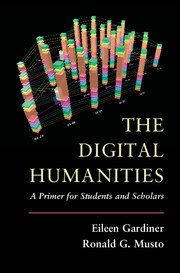Book contents
- Frontmatter
- Contents
- List of Illustrations
- Preface and Acknowledgments
- 1 Introduction to the Digital Humanities
- 2 The Organization of Humanities Research
- 3 The Elements of Digital Humanities: Text and Document
- 4 The Elements of Digital Humanities: Object, Artifact, Image, Sound, Space
- 5 Digital Tools
- 6 Digital Environments
- 7 Publication: Prerelease, Release and Beyond
- 8 The Meta-Issues of Digital Humanities 1
- 9 Meta-Issues 2: Copyright and Other Rights, Digital Rights Management, Open Access
- 10 The Evolving Landscape for the Digital Humanities
- Epilogue: The Half-Life of Wisdom
- Appendix: Digital Tools
- Notes
- Glossary
- Bibliography on Digital Humanities
- Index
Preface and Acknowledgments
Published online by Cambridge University Press: 05 July 2015
- Frontmatter
- Contents
- List of Illustrations
- Preface and Acknowledgments
- 1 Introduction to the Digital Humanities
- 2 The Organization of Humanities Research
- 3 The Elements of Digital Humanities: Text and Document
- 4 The Elements of Digital Humanities: Object, Artifact, Image, Sound, Space
- 5 Digital Tools
- 6 Digital Environments
- 7 Publication: Prerelease, Release and Beyond
- 8 The Meta-Issues of Digital Humanities 1
- 9 Meta-Issues 2: Copyright and Other Rights, Digital Rights Management, Open Access
- 10 The Evolving Landscape for the Digital Humanities
- Epilogue: The Half-Life of Wisdom
- Appendix: Digital Tools
- Notes
- Glossary
- Bibliography on Digital Humanities
- Index
Summary
The following book grew out of a 2010 Fulbright Fellowship proposal by Eileen Gardiner for teaching digital humanities to undergraduates and graduate students at the National University of Ireland, Galway. The proposal was successful, but another challenge presented itself – taking on the executive directorship of the Medieval Academy of America – so that pedagogical plan was transformed into a book that we hope will guide and benefit more than the original several dozen students.
This book also derives significantly from our many years as both scholars and publishers. In 1993, at our own Italica Press, we had published some of the first e-books for scholars, including The Marvels of Rome for the Macintosh, an early digital (HyperCard) edition of the celebrated medieval guide to the city, one of the earliest electronic books produced. We also draw on our twelve years at the American Council of Learned Societies (ACLS) where we took over leadership of an electronic publishing project shortly after it was funded by the Andrew W. Mellon Foundation. The ACLS History E-Book Project, later ACLS Humanities E-Book (HEB), was a forward-looking project in 1999, with the goal of publishing approximately eighty-five new digital monographs in history, adding a substantial digital backlist, incorporating the insights from the digital realm and pushing the boundaries of scholarly communication in the humanities. When we left HEB in 2011, it had published nearly four thousand e-books, including a large backlist of print-first titles converted into digital format and more than one hundred new titles that ranged from born-digital projects to enhanced digital monographs featuring sound, image libraries, video, virtual reality, archival databases and other external resources.
During our time at ACLS, we had the opportunity to add to our own publishing experiences by engaging with scholars from a variety of humanities disciplines who were pioneers in the emerging field of what only later would begin to be called the “digital humanities.”
- Type
- Chapter
- Information
- The Digital HumanitiesA Primer for Students and Scholars, pp. vii - xivPublisher: Cambridge University PressPrint publication year: 2015



